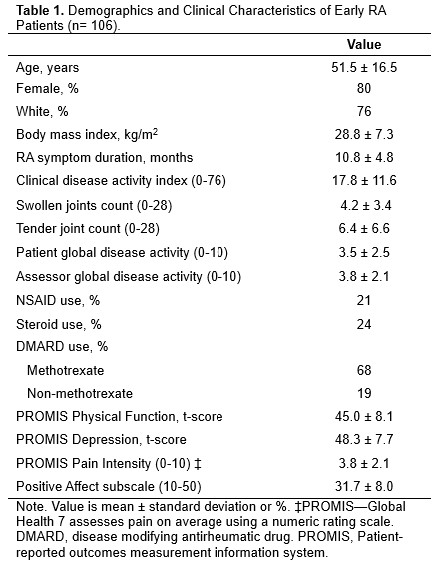Session Information
Date: Monday, October 27, 2025
Title: (1248–1271) Patient Outcomes, Preferences, & Attitudes Poster II
Session Type: Poster Session B
Session Time: 10:30AM-12:30PM
Background/Purpose: Rheumatoid arthritis (RA) is a chronic inflammatory disease that can significantly impair physical function and quality of life. While physical symptoms such as joint pain and swelling are primary drivers of disability, psychosocial factors, including emotional well-being, may also influence functional outcomes. Positive affect—defined as the experience of pleasurable emotions and mood—has been associated with better health outcomes in various chronic conditions, but its relationship with physical function in RA, especially in the early stages of the disease, is not well understood. Gaining insight into this relationship early in the disease course is critical, as it may inform more integrated approaches to treatment and improve long-term functional outcomes. This study aimed to evaluate the association between positive affect and physical function in individuals with early, active RA.
Methods: Cross-sectional baseline data were analyzed from adults with early RA enrolled in the on-going Central Pain in RA 2 (CPIRA-2) study. Eligible participants met the ACR/EULAR 1987 or 2010 criteria for RA, had persistent joint symptoms for ≤ 24 months, and active disease. Physical function was assessed by the PROMIS physical function questionnaire, which evaluates the functional capabilities of various body regions and performance of activities of daily living; higher scores indicate better physical functioning. Positive affect was measured with the positive affect subscale of the PANAS self-report questionnaire, a 10-item scale assessing positive emotions such as joy, enthusiasm, and alertness; higher scores reflect greater positive affect. PROMIS instruments were also used to assess symptoms of pain and depression. Descriptive statistics summarized demographic and clinical characteristics. Linear regression models were conducted to estimate unadjusted and adjusted associations between positive affect and physical function. Adjusted models controlled for age, sex, body mass index, swollen joint count, symptom duration, pain, and depression.
Results: Our sample included 106 patients (80% female, 76% white) with mean (SD) age of 51.5 (16.5) years, BMI of 28.8 (7.3) kg/m2, and RA symptom duration of 10.8 (4.8) months (Table 1). Approximately 61% had mild to severe functional limitations (t-score ≤ 45). In unadjusted analysis, greater positive affect (β = 2.4 [95% CI 1.6 to 3.3]) was associated with better physical function. In an adjusted linear regression model, greater positive affect remained associated with physical function; younger age, and lower pain intensity were also significantly associated with better physical function (Table 2).
Conclusion: Greater positive affect was associated with better physical function in patients with early RA, even after adjusting for clinical and demographic factors. Longitudinal investigations are needed to better assess the true directionality of these relationships. Our findings suggest that interventions integrating strategies to enhance emotional well-being alongside effective pain management may help to improve and maintain physical function during the early stages of RA.
To cite this abstract in AMA style:
Aydemir B, Song J, muhammad L, Dunlop D, Chang R, Marder W, Deane K, Bingham C, Bykerk V, Edwards R, Moskowitz J, Lee Y. Association between Positive Emotions and Physical Function in Early Rheumatoid Arthritis Patients [abstract]. Arthritis Rheumatol. 2025; 77 (suppl 9). https://acrabstracts.org/abstract/association-between-positive-emotions-and-physical-function-in-early-rheumatoid-arthritis-patients/. Accessed .« Back to ACR Convergence 2025
ACR Meeting Abstracts - https://acrabstracts.org/abstract/association-between-positive-emotions-and-physical-function-in-early-rheumatoid-arthritis-patients/


.jpg)